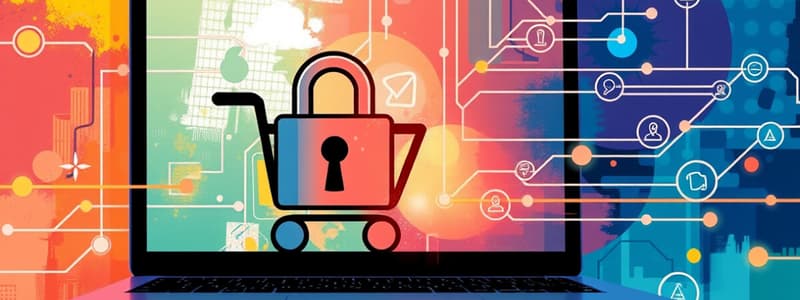Podcast
Questions and Answers
What is a primary advantage of e-commerce in terms of transaction reach?
What is a primary advantage of e-commerce in terms of transaction reach?
- It allows businesses to reach worldwide clients. (correct)
- It restricts businesses to their local market.
- It limits the customer's buying options.
- It requires physical storefronts for customer interaction.
Which of the following is a disadvantage of e-commerce related to security?
Which of the following is a disadvantage of e-commerce related to security?
- Internet security is highly reliable.
- Hacker attacks can paralyze e-commerce operations. (correct)
- E-commerce systems are immune to viruses.
- Privacy of e-transactions is well-protected.
Which feature of e-commerce enhances customer convenience and reduces shopping costs?
Which feature of e-commerce enhances customer convenience and reduces shopping costs?
- Higher transaction fees across platforms.
- Increased need for physical stores.
- Limited access to markets.
- Ubiquity of internet technology. (correct)
What is one significant threat to e-commerce mentioned in the content?
What is one significant threat to e-commerce mentioned in the content?
Which statement about electronic data interchange (EDI) is true concerning small businesses?
Which statement about electronic data interchange (EDI) is true concerning small businesses?
What is a primary focus of supply chain efficiency?
What is a primary focus of supply chain efficiency?
Which of the following best describes the concept of supply chain responsiveness?
Which of the following best describes the concept of supply chain responsiveness?
How is the effectiveness of a supply chain typically evaluated?
How is the effectiveness of a supply chain typically evaluated?
What advantage does the integration of the Internet in supply chain management primarily provide?
What advantage does the integration of the Internet in supply chain management primarily provide?
What aspect of supply chain performance monitoring is emphasized in many industries?
What aspect of supply chain performance monitoring is emphasized in many industries?
Flashcards are hidden until you start studying
Study Notes
Advantages of E-commerce
- Enables buying and selling of goods and services from home or business premises.
- Facilitates transactions anytime and anywhere, enhancing convenience.
- Consumers can easily find the lowest prices for products or services.
- Allows businesses to tap into a global market and establish international partnerships.
- Reduces order processing costs, making transactions more efficient.
- Accelerates electronic funds transfers, enhancing payment processes.
- Simplifies supply chain management, allowing tracking and ordering from multiple vendors.
Disadvantages of E-commerce
- Electronic Data Interchange (EDI) can be costly for small businesses to implement.
- Internet security issues, such as viruses and hacking, pose risks to e-commerce operations.
- Privacy concerns exist, with no guarantee that e-transactions remain confidential.
- Shopping experience may feel impersonal due to the lack of face-to-face interactions.
Threats to E-commerce
- Hackers may target e-commerce sites to steal data or disrupt services.
- Risk of server breaches and theft of customer information.
- Impersonation attacks through cloned e-commerce sites to deceive customers.
- Insider threats from detractors within the organization who may sabotage systems.
- Identifying potential threats from competitors and former employees is crucial for security.
Features of E-commerce
- Ubiquity: Market access everywhere through mobile devices, enhancing convenience and reducing shopping costs.
- Delivery Logistics: Involves coordinating order receipts, warehouses, carriers for product delivery, and invoicing systems.
- Returns Management: Establishes processes for handling defective or surplus goods returned by customers.
Measuring Supply Chain Performance
- Performance assessed on cost reduction and value enhancement; vital for managing operational budgets.
- Efficiency: Focuses on minimizing costs through lower inventory levels and higher turnover rates.
- Responsiveness: Concerns rapid adjustment to market demands, balancing inventory costs with sales opportunities.
- Effectiveness: Pertains to the value creation for customers, emphasizing "value chains" over mere cost reduction.
Advantages of Internet/E-commerce Integrated Supply Chain
- Speed: Quick response to market changes contributes to competitive advantage.
- Cost Efficiency: Utilizes the Internet to decrease operational costs within the supply chain.
- Flexibility: Easier adaptation to changes in supply and demand, shortening the supply chain duration.
Electronic Data Interchange (EDI)
- Facilitates standardized electronic communication of business information.
- EDI reduces transaction costs and enhances partner relationships.
- EDI is a component of broader electronic commerce, improving information exchange with trading partners.
EDI Layered Architecture
- Semantic Layer: Defines business applications and required information exchanges (e.g., purchase orders).
- Standards Translation Layer: Standardizes communication formats (ANSI X12 vs. EDIFACT).
- Transport Layer: Specifies the methods of data transmission (email, postal services).
- Physical Network Layer: Includes the infrastructure for data transfer (Internet, dial-up lines).
Privacy and Authorization in E-commerce
- Privacy: Ensures that information is accessed only by authorized individuals through encryption methods.
- Authorization: Determines whether a user has the right to request or perform specific actions, often linked with authentication processes.
Security Frameworks and Guidelines
- SSE-CMM: Provides models for security management in IT systems.
- COBIT: Focuses on creating clear IT security policies and practices.
- ISO 17799: Outlines guidelines for implementing security management frameworks across various security domains.
Firewalls
- A network security system that controls traffic based on set rules, creating barriers between secure internal networks and external threats.
- Available as both software applications and hardware appliances, enhancing network protection.
- Basic firewall functions are often integrated into personal computer operating systems and routers.
Studying That Suits You
Use AI to generate personalized quizzes and flashcards to suit your learning preferences.




